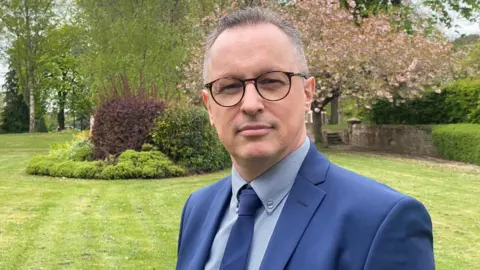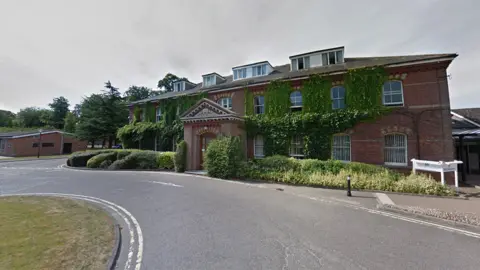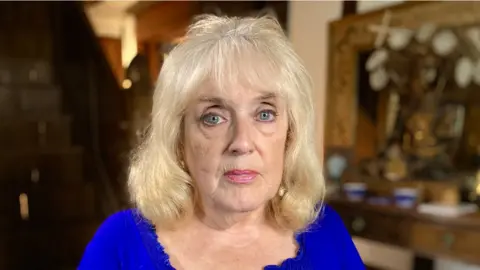Norfolk and Suffolk NHS Foundation Trust warned by CQC over failures
 John Fairhall/BBC
John Fairhall/BBCMore than 100 patients died unexpectedly in a two-year period at England's worst-performing mental health trust, inspectors say.
Norfolk and Suffolk NHS Foundation Trust (NSFT) has been warned by the Care Quality Commission (CQC) that it must improve.
Norwich South Labour MP Clive Lewis has called on the government to take direct control of NSFT with immediate effect.
NSFT chief executive officer Stuart Richardson said he was "deeply sorry".
Following the latest inspection, the trust was downgraded from "requires improvement" to "inadequate" and remains the only mental health trust within the NHS's improvement regime for not meeting standards.
Mr Lewis cites claims from mental health campaigners that there could have been as many "1,000 avoidable mental illness-related deaths" at the trust over the years - a figure the trust says it does not recognise.
In his letter to the Health Secretary Sajid Javid, Mr Lewis, a Labour MP, said: "The inadequate delivery of mental health services puts lives and wellbeing at risk.
"Given this, it is even more imperative that the Government steps in to take over failing trusts, like NSFT."
Jo Churchill, the Conservative MP for Bury St Edmunds, tweeted on Thursday: "Previous attempts to drive improvements, including a change in leadership has not delivered, my constituents deserve better."
Allow X content?
Two wards were immediately closed to new patients after a CQC visit in November. The trust, which has a £305m budget and employs 4,227 staff, was threatened with enforcement action if urgent measures were not taken.
Other issues highlighted by the CQC include staffing problems, including an annual nurse vacancy rate of more than 17%, staff not completing regular checks on an adult long-stay ward and a severe deterioration on the Dragonfly Unit in Carlton Colville, Suffolk - an inpatient ward for children and young people.
Services for people with autism and learning difficulties, however, were rated "good".

Key findings from the CQC
 Google
Google- 115 "unexpected or potentially avoidable" deaths reported over a two-year period
- 15 people in contact with trust services were "thought likely" to have taken their own lives in the previous three months
- The long stay unit for adults had one consultant psychiatrist working half a day per week when patient reviews took place, and a locum junior doctor was shared between this service and another
- A patient's carer shared concerns about illegal substances on a ward with staff not always taking appropriate action
- A huge rise in referrals within children and adolescent community services - from 95 in August 2020 to 2,547 in July 2021

Craig Howarth, CQC head of inspection for mental health and community services, said: "Due to our findings, we have served the trust a warning notice so its leaders are clear about what must be done to improve patient care and safety.
"They have a legal obligation to deliver this."
The notice requires improvements in a number of areas, including maintaining safe staffing levels.
 BBC/Jamie Niblock
BBC/Jamie NiblockAfter the report came out, activists from the Campaign to Save Mental Health Services in Norfolk and Suffolk staged a protest outside the trust's Norwich headquarters.
They attached paper hearts to hedges with the names of people they claimed had died while in the trust's care.
'I tried to make things better'
 Martin Giles/BBC
Martin Giles/BBCSheila Preston was a governor at the trust when her son Leo, who had a serious mental illness, died from an suspected accidental overdose.
She was determined to make a difference, but after serving a full term of nine years she had become highly critical at the way the trust had been led.
"They have completely failed in their responsibility to the public," she said.
"There doesn't seem to be any accountability when things have been going really wrong.
"I think things have got worse in all respects.
"Unfortunately, I cannot change the fact that I'm angry and I spent a lot of time trying to make things better. I failed."

Analysis by Nikki Fox, Health Correspondent, BBC Look East
Transforming a failing trust can't be done overnight. But campaigners say while they're told it's a marathon not a sprint, many don't make it to the end of that journey.
Things started to go wrong in 2013, when the trust oversaw a so-called "radical redesign".
A total of 136 beds were cut and a large number of experienced staff were lost following a 20% cut to its budget over four years.
Staffing shortages have persisted and the trust has found it difficult to recruit specialist mental health nurses and consultants.
It has meant it's largely become a crisis management service where people are helped in an emergency but quickly end up back in the service as they wait too long to have their underlying condition treated in the community, because staff are overwhelmed.
But staffing shortages are a nationwide problem, so why is this mental health provider the only one in the NHS's recovery support programme?
Norfolk has the highest number of referrals for young people in the country and a high elderly population, so demand in those age groups is significant.
But management instability has also meant ineffective leadership, with eight chief executives in 10 years. It's the oversight to bring in staff with the right skills, join services together and learn from mistakes that appears to be lacking.
NSFT has already had an improvement director and managers seconded from another trust in East London, but some services are getting worse not better.
There isn't much left to try.

'Deeply sorry'
 NSFT
NSFTStuart Richardson, chief executive officer at NSFT, said: "The people of Norfolk and Suffolk deserve good quality mental health services and we are committed to achieving this.
"We recognise that we have not made the expected progress in some key areas, and I am deeply sorry for this and the impact this will have had on people who need support with their mental health.
"We have already taken action that will help us improve, including increasing support and training for our staff, redoubling our efforts to recruit more nurses and doctors, and bringing services closer to people's homes through our community transformation projects."
Zoe Billingham, who chairs the trust's board, said NSFT had made some improvements.
"We now have a leadership team with clear and ambitious plans, and changes in how we work across the health and care system means we have an opportunity to provide mental health services differently," she said.
"We are determined to make the required changes with pace and focus."

What are your experiences with the N & S FT? Email [email protected].
Please include a contact number if you are willing to speak to a BBC journalist. You can also get in touch in the following ways:
- WhatsApp: +44 7756 165803
- Tweet: @BBC_HaveYourSay
- Upload pictures or video
- Please read our terms & conditions and privacy policy

Find BBC News: East of England on Facebook, Instagram and Twitter. If you have a story suggestion email [email protected]
